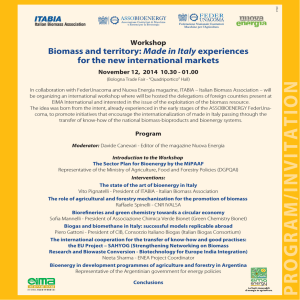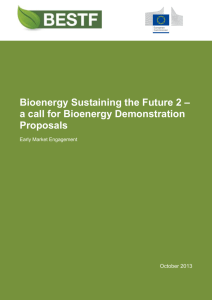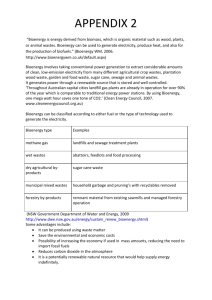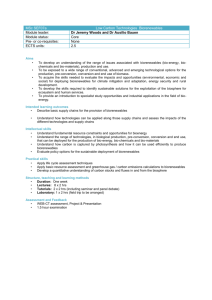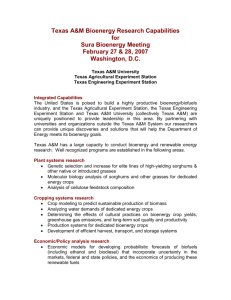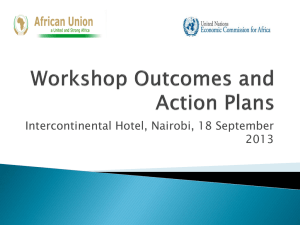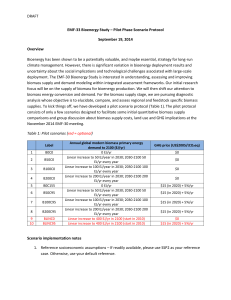project rationale - Food and Agriculture Organization of the United
advertisement
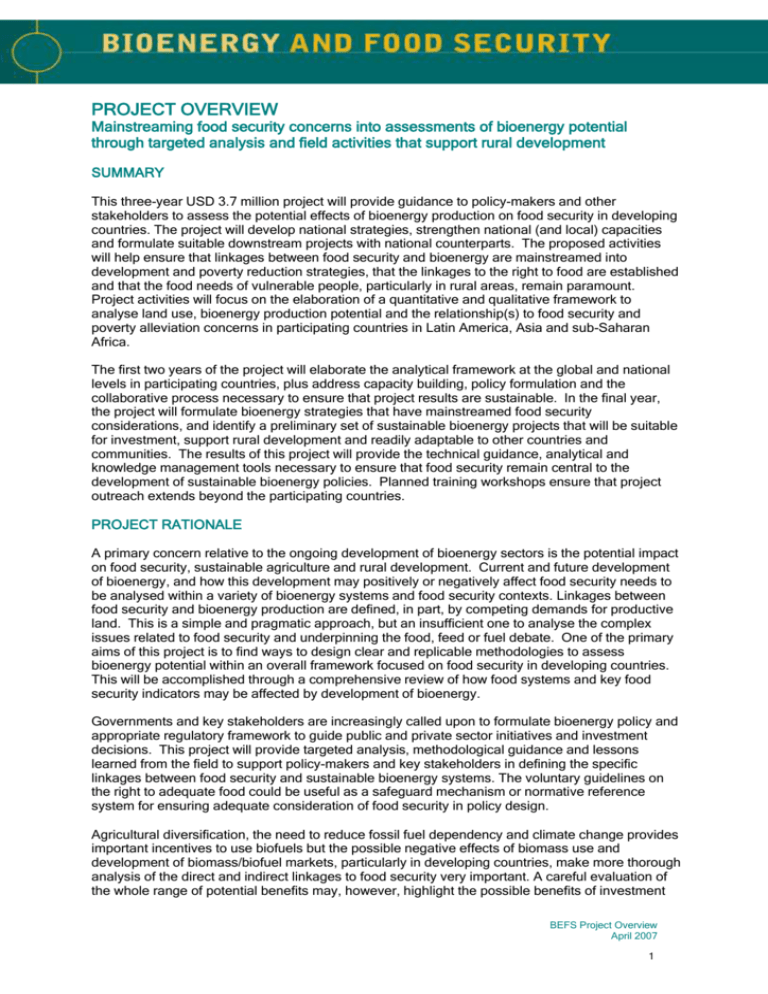
PROJECT OVERVIEW Mainstreaming food security concerns into assessments of bioenergy potential through targeted analysis and field activities that support rural development SUMMARY This three-year USD 3.7 million project will provide guidance to policy-makers and other stakeholders to assess the potential effects of bioenergy production on food security in developing countries. The project will develop national strategies, strengthen national (and local) capacities and formulate suitable downstream projects with national counterparts. The proposed activities will help ensure that linkages between food security and bioenergy are mainstreamed into development and poverty reduction strategies, that the linkages to the right to food are established and that the food needs of vulnerable people, particularly in rural areas, remain paramount. Project activities will focus on the elaboration of a quantitative and qualitative framework to analyse land use, bioenergy production potential and the relationship(s) to food security and poverty alleviation concerns in participating countries in Latin America, Asia and sub-Saharan Africa. The first two years of the project will elaborate the analytical framework at the global and national levels in participating countries, plus address capacity building, policy formulation and the collaborative process necessary to ensure that project results are sustainable. In the final year, the project will formulate bioenergy strategies that have mainstreamed food security considerations, and identify a preliminary set of sustainable bioenergy projects that will be suitable for investment, support rural development and readily adaptable to other countries and communities. The results of this project will provide the technical guidance, analytical and knowledge management tools necessary to ensure that food security remain central to the development of sustainable bioenergy policies. Planned training workshops ensure that project outreach extends beyond the participating countries. PROJECT RATIONALE A primary concern relative to the ongoing development of bioenergy sectors is the potential impact on food security, sustainable agriculture and rural development. Current and future development of bioenergy, and how this development may positively or negatively affect food security needs to be analysed within a variety of bioenergy systems and food security contexts. Linkages between food security and bioenergy production are defined, in part, by competing demands for productive land. This is a simple and pragmatic approach, but an insufficient one to analyse the complex issues related to food security and underpinning the food, feed or fuel debate. One of the primary aims of this project is to find ways to design clear and replicable methodologies to assess bioenergy potential within an overall framework focused on food security in developing countries. This will be accomplished through a comprehensive review of how food systems and key food security indicators may be affected by development of bioenergy. Governments and key stakeholders are increasingly called upon to formulate bioenergy policy and appropriate regulatory framework to guide public and private sector initiatives and investment decisions. This project will provide targeted analysis, methodological guidance and lessons learned from the field to support policy-makers and key stakeholders in defining the specific linkages between food security and sustainable bioenergy systems. The voluntary guidelines on the right to adequate food could be useful as a safeguard mechanism or normative reference system for ensuring adequate consideration of food security in policy design. Agricultural diversification, the need to reduce fossil fuel dependency and climate change provides important incentives to use biofuels but the possible negative effects of biomass use and development of biomass/biofuel markets, particularly in developing countries, make more thorough analysis of the direct and indirect linkages to food security very important. A careful evaluation of the whole range of potential benefits may, however, highlight the possible benefits of investment BEFS Project Overview April 2007 1 and policy decisions that favour bioenergy. Most important for this project is a balanced analysis of the food-fuel nexus. Potential Benefits of Bioenergy Systems Diversification of agricultural output to feedstock crops for bioenergy Development of infrastructure and employment in the agricultural sector, particularly rural areas Competition for land and other production factors Diversification of domestic energy supply and increased energy security Rural women have more time to dedicate to income earning activities as household energy burden potentially reduced, less child labour Access to energy for rural small and medium enterprises (SMEs) improved Technological development through investment in new bioenergy technologies, using lignocellulosic biomass Climate change mitigation Mitigation of local environmental concerns - water pollution, loss of biodiversity, land degradation Revenue from payments for environmental services (PES) and monetization of carbon credits Potential Negative Effects of Bioenergy Systems Food Security Indicators Proportion chronically undernourished (measured by prevalence of stunting amongst children under five years old) Adult literacy, particularly female Proportion of household income directed to food Population growth GDP growth per capita Agricultural contribution to GDP Health expenditure as a proportion of GDP Proportion of adults infected with HIV Number of food emergencies UNDP Human Development Index Degree of import and/or export dependence Domestic food production (food availability) Purchasing power (food access) Access to water and sanitation facilities (food utilization) Decreased access to food due to increased food commodity prices driven by competition between biomass for energy and food production Decreased food availability due to replacement of subsistence farm land by energy plantations Increased environmental pressure due to introduction or expansion of unsustainable bioenergy systems, leading to water pollution, loss of biodiversity, land degradation Pressure on prices of other goods and services related to land-use and biomass Further development of bioenergy systems will increasingly highlight the direct linkages between food security and energy security. These linkages function as an additional source of uncertainty in global production and marketing systems; markets that are already more susceptible to greater variability in pricing and production due in part to trade liberalization and structural adjustments in food and agricultural sectors. Natural disasters and lack of productive input factors, such as fertilizer or water resources, also constrain and/or result in the loss of agricultural output, and lowers overall food availability. The competition for more arable land and water resources directed to biofuel production may lead to higher and less stable food prices, for countries that are both net food importers and exporters. This may be particularly true for low-income, food deficit countries (LIFDCs) that already have a large proportion of undernourished and are net importers of basic foods, and may face serious problems of food access within vulnerable populations. Poor households tend to spend a larger proportion of income on food than other items, including energy and thus, may be particularly challenged by rising food prices, globally and locally.1 The primary task of project activities is to carefully evaluate all relevant linkages between bioenergy and food security, including some of the most relevant listed below: development of rural infrastructure, employment generation, and crop diversification, with a net positive impact on access to food; climate change mitigation through the substitution of fossil fuels and energy intensive materials, as well as carbon sequestration (conserving existing carbon sinks and developing new sinks), mobilizing carbon finance for rural investment and contributing to the mitigation of climate change impacts (on, inter alia, food security); 1 Countries with more than 20 percent of the population considered undernourished include Angola, Bangladesh, Bolivia, Botswana, Burundi, Cambodia, Cameroon, Central African Republic, Chad, Dem People’s Republic of Korea, Dem. Republic of the Congo, Dominican Republic, Eritrea, Ethiopia, Gambia, Guatemala, Guinea, Haiti, Honduras, India, Kenya, Lao People’s Dem. Republic, Liberia, Madagascar, Malawi, Mali, Mongolia, Mozambique, Namibia, Nicaragua, Niger, Pakistan, Panama, Philippines, Rwanda, Senegal, Sierra Leone, Sri Lanka, Sudan, Tanzania, Thailand, Togo, Yemen, Zambia and Zimbabwe (FAO SOFI 2005). BEFS Project Overview April 2007 2 better return on investment from bioenergy business models as compared to conventional agriculture, could lead to an overall increase in rural investment, making capital available for enhancing agricultural productivity levels of all rural, including food, production systems; the diversification of domestic energy supply leads to increased energy security and independence from imports and provides for a hedge against energy price fluctuations, energy access shortages and resulting negative effects on overall development; environmental degradation and loss of biodiversity can be reduced or aggravated, depending on the bioenergy system. The effect on food security would be negative or positive, depending on either an increased vs. decreased overall resilience of rural agro-ecosystems. Overall, context and sector specific analysis is required to find ways to ensure that further development in the sector will support food security goals while ensuring sustainable bioenergy production. Smaller-scale, rural-based production may benefit the rural poor more than largescale, industrialized output and provide market outlets to smallholders, reduce transport costs for remote populations and achieve greater environmental and socio-economic gains for the most vulnerable populations. Three primary sets of stakeholders will utilize the results of this project, as follows: Policy-makers in developing countries who will be able to use the results of this project to design a national strategy to harmonize food security and bioenergy policies and in turn, mainstream bioenergy into rural development initiatives; Public and private sector stakeholders in developing countries who will have a common regulatory framework and policy environment to base food policy and investment decisions in optimal projects, investments and business models for production, processing and end-use equipment for bioenergy; Policy-makers in OECD countries who will be able to make informed decisions on policies and investments related to domestic energy production relative to the food security concerns, costs and security of supply of bioenergy imports from developing countries. Most importantly, this project establishes an overall analytical framework through targeted analysis and field activities that aims to highlight that the food needs of millions of people who are chronically undernourished and food insecure must remain of primary concern in the design and implementation of bioenergy policies and projects in developing and developed countries. The overall objectives and three-year timeline of this project are designed to create the foundation for sustainable analysis of the bioenergy/food security nexus, and lay the groundwork for future food security assessments that could link bioenergy output to household income, food utilization, economic access to food and food availability. PROJECT STRATEGY The strategy of this project is based on three central components: (i) development of an overall bioenergy and food security analytical framework and methodological guidance; (ii) estimation of bioenergy potential and food security implications within specific national and subnational contexts, and (iii) development of field activities that are replicable, sustainable and will strengthen both institutional capacities, as well as that of key national stakeholders. The activities are interdependent, and successful results will rely on an iterative process based on close integration and explicit feedback loops between the conceptual, analytical, empirical and operational levels between field activities, FAO Country Offices and headquarters. Increasingly, and through the project activities (particularly capacity-building), responsibilities for knowledge transfer, analysis and capacity-building will be shifted to national stakeholders, with attention to the different roles of the public and private sectors. BEFS Project Overview April 2007 3 The project is designed to ensure that methodological guidance, capacity-building activities and recommendations for regulatory frameworks and supporting institutions (private and public) help develop sustainable bioenergy systems that support and enhance food security. The involvement of national staff and key stakeholders will strengthen subnational and national capacity in the field to analyse the food security-bioenergy nexus, as well as support the development of national expertise beyond the end of the project. The role of private-public relationships is critically important, and could facilitate technology transfer into participating countries. To support development of a national bioenergy and food security strategy, a multisectoral national task force or working group will be convened to guide the project, help disseminate project results, become a sustainable means to catalyse national and subnational action, and importantly, facilitate public-private sector collaboration. The project will provide important case studies, methodological guidance and toolkits that will improve global understanding of the linkages between food security and bioenergy production, use and marketing. The project tools, models and data will be applied and tested in three to five countries, on the national and subnational level, in order to derive insights related to the specific food security context and agronomic potential for each of the countries, test the feasibility of the tools with key stakeholders and, once finalized, replicate project guidance/results to other countries with similar food-feed-fuel contexts. DEVELOPMENT OBJECTIVE The overall development objective of the project is to enhance food security though mainstreaming sustainable bioenergy systems into rural development and minimize the risk of detrimental impacts of bioenergy on food security. Core strategic objectives at the outcome level are to develop (1) a comprehensive understanding of the nexus between food security and sustainable bioenergy is developed; required knowledge, data and analytical tools are available; (2) public and private stakeholders in countries develop the capacity to integrate food security concerns into appropriate regulatory framework, policies and strategies for the development of sustainable bioenergy; and (3) three to five countries (with respective regional outreach to 2-4 additional countries per project region (Sub-Saharan Africa, Asia-Pacific, Latin America), initiate coordinated action to mainstream food security into bioenergy systems that impact rural development. For more information, please contact Jennifer Nyberg Project Coordinator Jennifer.Nyberg@fao.org +39 06 570 55632 Gustavo Best Senior Energy Coordinator Gustavo.Best@fao.org +39 06 570 55534 Ingmar Juergens Technical Advisor (Bioenergy Officer) Ingmar.Juergens@fao.org +39 06 570 53639 BEFS Project Overview April 2007 4
